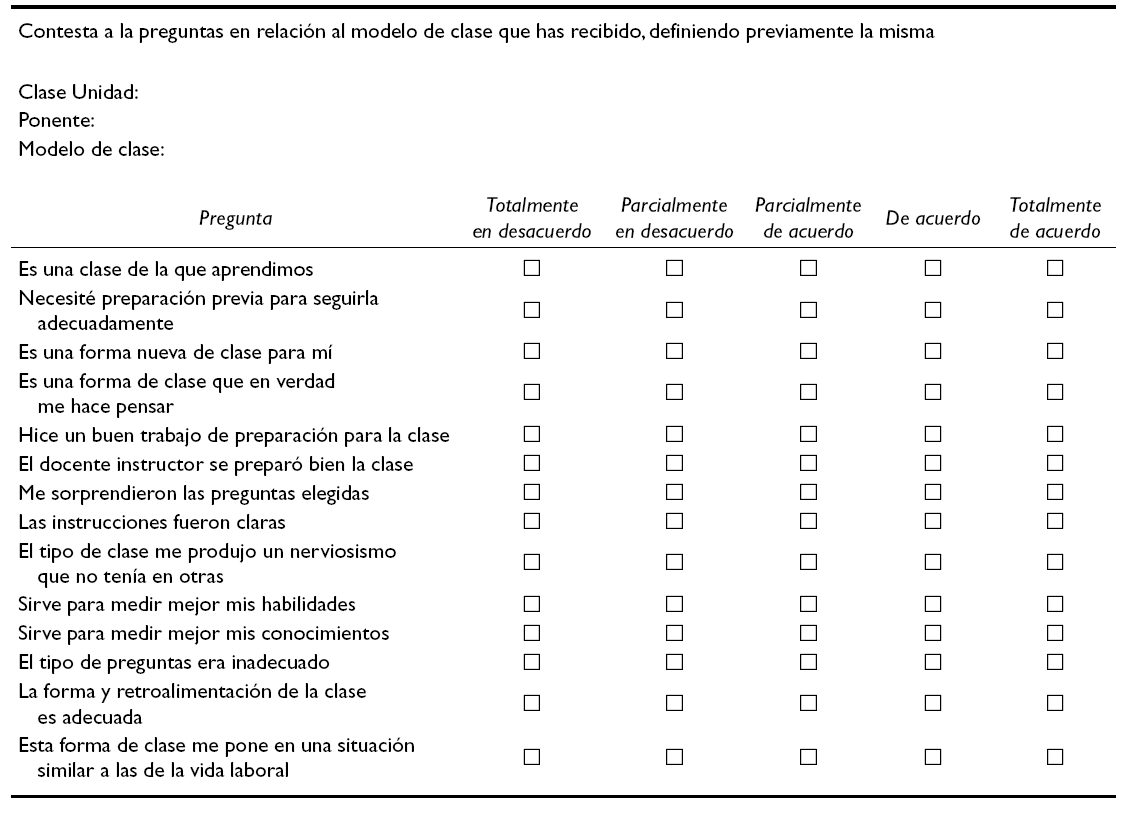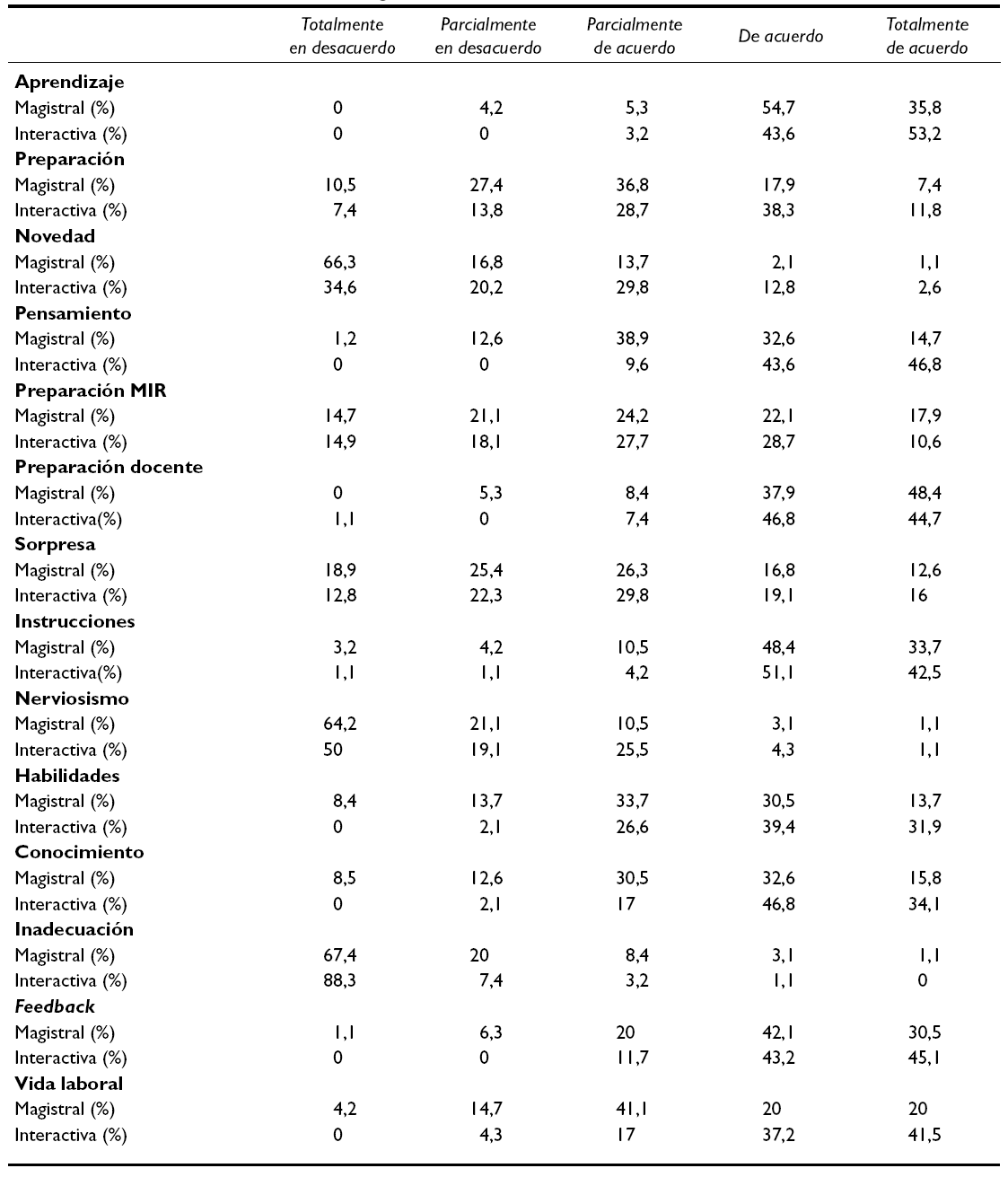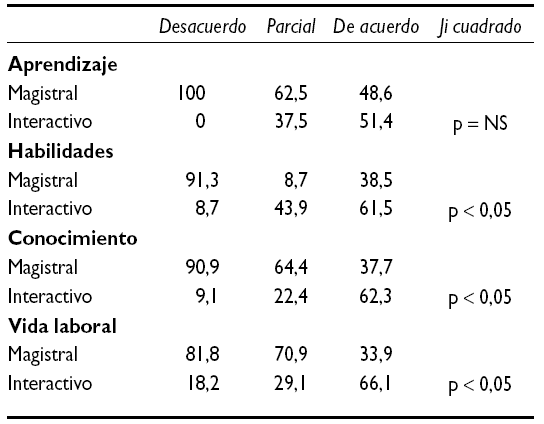Objetivo. Analizar qué metodología formativa teórica podría dar mejores resultados en el aprendizaje, habilidades clínicas, conocimientos teóricos adquiridos y utilidad en la vida laboral en los MIR en medicina física y rehabilitación (MFR).
Material y método. Estudio longitudinal prospectivo, realizado durante las clases del programa formativo de residentes 2006-2007, con la participación de los MIR en MFR. Al finalizar las clases se administró un cuestionario para valorar el modelo de clase (magistral e interactivo). Valoraba el aprendizaje, la habilidad, el conocimiento y la vida laboral bajo la percepción del residente. La hipótesis era que el modelo interactivo daba mayor satisfacción en los campos de aprendizaje, habilidades, conocimiento y vida laboral que el modelo magistral. Se realizó un estudio bivariante con el paquete estadístico SPSS® 15.
Resultados. De los 189 cuestionarios, 95 se consideran clases magistrales y 94 clases interactivas. No existen diferencias entre aprendizaje y modelo de clase. Existe asociación entre habilidades y modelos de clase a favor del modelo interactivo (desacuerdo 8,7 frente a 91,3%, parcial 43,9 frente a 56,1% y de acuerdo 61,5 frente a 50,3%). Existe asociación entre conocimiento y modelos de clase a favor del interactivo (desacuerdo 9,1 frente a 90,9 %, parcial 35,6 frente a 64,4% y de acuerdo 62,3 frente a 37,7%). Existe asociación entre utilidad de la vida laboral y modelos de clase, a favor del interactivo (desacuerdo 18,2 frente a 81,8%, parcial 29,1 frente a 70,9% y de acuerdo 66,1 frente a 33,9%).
Conclusión. El modelo interactivo da mejores resultados en habilidades, conocimiento y utilidad de la vida laboral, pero no en el aprendizaje.
Objective. To determine what type of theoretical training methodology for residents in Physical Medicine and Rehabilitation (PM&R) provides better results for learning, attaining clinical skills and knowledge, and relevance to professional life.
Material and methods. Prospective longitudinal study, performed during the 2006-2007 resident training program in PM&R. At the end of each class, a questionnaire designed for the study was distributed to residents for their evaluation of the class model (lecture-based master class or interactive class) as related to learning, clinical skills, knowledge, and professional life. The hypothesis was that the interactive class would give better satisfaction in these areas than the master model. Qualitative values were compared using chi-square distributions.
Results. Among the 183 questionnaires administered, 50.3 % were for master classes and 49.7 % for interactive classes. For the recodified question on learning (We gained knowledge in this class) 48.6 % agreed for the master class model and 51.4% for the interactive model. For skills, positive responses were 38.5 % and 61.5 %, respectively; for knowledge, 37.7% and 62.3%, respectively; and for professional life, 33.9 % and 66.1 %, respectively. There were no associations between learning and type of class. There was, however, an association between skills, knowledge and professional life with class model (p < 0.05), such that the interactive model gave better results than the master class.
Conclusion. According to the subjective opinion of PM&R medical residents, the interactive teaching method provides a better outcome for acquisition of clinical skills, knowledge, and usefulness in clinical practice, but does not differ from lecture-based methods for learning.
Artículo
Comprando el artículo el PDF del mismo podrá ser descargado
Precio 19,34 €
Comprar ahora









